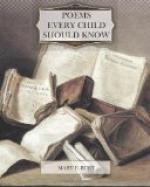It seemed the loveliness of
things
Did teach him
all their use,
For, in mere weeds, and stones,
and springs,
He found a healing
power profuse.
Men granted that his speech
was wise,
But, when a glance
they caught
Of his slim grace and woman’s
eyes,
They laughed,
and called him good-for-naught.
Yet after he was dead and
gone,
And e’en
his memory dim,
Earth seemed more sweet to
live upon,
More full of love,
because of him.
And day by day more holy grew
Each spot where
he had trod,
Till after-poets only knew
Their first-born
brother as a god.
JAMES RUSSELL LOWELL.
HOW THEY BROUGHT THE GOOD NEWS FROM GHENT TO AIX.
I have an old essay written by a lad of fourteen years on “How They Brought the Good News from Ghent to Aix.” I should judge from this essay that any boy at that age would like the poem, even if he had not himself been over the ground as this boy had. (1812-89.)
I sprang to the stirrup, and
Joris, and he;
I galloped, Dirck galloped,
we galloped all three;
“Good speed!” cried
the watch as the gate-bolts undrew;
“Speed!” echoed the
wall to us galloping through;
Behind shut the postern, the
lights sank to rest,
And into the midnight we galloped
abreast.
Not a word to each other;
we kept the great pace
Neck by neck, stride by stride,
never changing our place;
I turned in my saddle and
made its girth tight,
Then shortened each stirrup,
and set the pique right,
Rebuckled the cheek-strap,
chained slacker the bit,
Nor galloped less steadily
Roland a whit.
’Twas moonset at starting;
but while we drew near
Lokeren, the cocks crew and
twilight dawned clear;
At Boom, a great yellow star
came out to see;
At Dueffeld, ’twas morning
as plain as could be;
And from Mecheln church-steeple
we heard the half-chime,
So Joris broke silence with,
“Yet there is time!”
At Aershot, up leaped of a
sudden the sun,
And against him the cattle
stood black every one,
To stare through the mist
at us galloping past,
And I saw my stout galloper
Roland at last,
With resolute shoulders, each
butting away
The haze, as some bluff river
headland its spray:
And his low head and crest,
just one sharp ear bent back
For my voice, and the other
pricked out on his track;
And one eye’s black
intelligence,—ever that glance
O’er its white edge
at me, his own master, askance!
And the thick, heavy spume-flakes
which aye and anon
His fierce lips shook upward
in galloping on.
By Hasselt, Dirck groaned;
and cried Joris, “Stay spur!
Your Roos galloped bravely,
the fault’s not in her,
We’ll remember at Aix”—for
one heard the quick wheeze
Of her chest, saw the stretched
neck and staggering knees,
And sunk tail, and horrible
heave of the flank,
As down on her haunches she
shuddered and sank.




